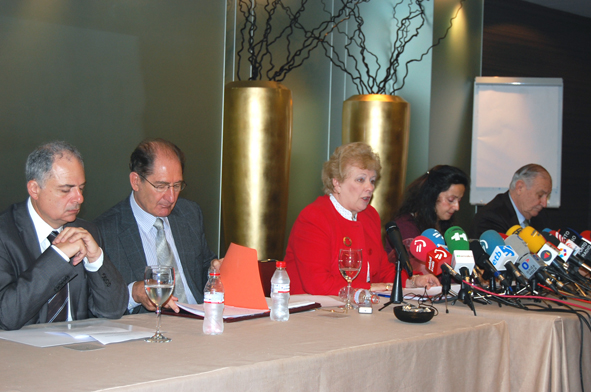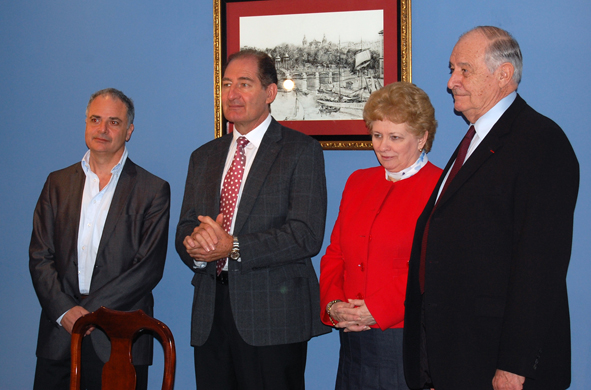Speech of Jonathan Powell
International Conference to promote a resolution of the conflict in the Basque Country
17th of October 2011
I am very grateful to Lokarri and the other organisers of this conference for inviting us to San Sebastian on this beautiful and optimistic day.
Tony Blair has asked me to say he is very sorry not to be able to be here himself today to participate in the conference but unfortunately he is fully engaged with the Middle East. He has asked me to come in his place and to represent him. He is committed to doing anything he can to help end this, the last armed confrontation in Europe, and will be putting out a statement later today.
We have not come to San Sebastian to lecture anyone on what they should do. All we want to do is share with you our own experiences in bringing an end to ancient and bloody conflicts elsewhere in the world. Whether what we learned from our successes and from our failures is relevant or helpful to you is a matter for you to decide.
My experience is derived from Northern Ireland where I spent ten years working for Tony Blair and with my colleagues and friends here today, Bertie Ahern and Gerry Adams.
Our conflict in Northern Ireland was sui generis and the solution we found was sui generis. It was a solution adapted to the situation in Northern Ireland and not easily transferable elsewhere. Nonetheless our experience in making peace may be useful to others just as we learned ourselves from what had happened before in South Africa.
Let me list just four of those lessons.
First peace is a process not an event. You don’t create trust over night. Conflicts carry a huge burden of history and ending the hatred and escaping the pain they engendered takes time. Peace has to mature, to put down roots and to be allowed to flourish. Both sides need to take small steps to convince other that they really are going to do what they promised and gradually build confidence. It took us nearly nine years after the Good Friday Agreement had been concluded to build that trust and implement the agreement in full.
The process of building trust can however only begin once you have put violence behind you for good and accepted that the only way to achieve your aims is by political and exclusively peaceful means. So the first and crucial step is to end the armed conflict irreversibly.
Second conflicts create consequences that need to be dealt with. In Northern Ireland dealing with the decommissioning of weapons took us more than a decade and the issues of prisoners and exiles were difficult and delicate which required political courage to tackle. The security situation needed to be normalised, prisoners rehabilitated and the needs of victims addressed. A conflict can only be ended and the consequences resolved if political leaders are prepared to take risks. If both sides are timid and stay in their comfort zone there will be no agreement and no lasting peace. Of course the end of the conflict also brings a peace dividend and in Northern Ireland we were able to redirect the billions we had spent on security to more productive uses for society.
Third, extremists will try to disrupt the peace but you cannot let peace become a hostage to the most extreme, as it has been for example in the Middle East where every suicide bombing disrupts the process. After we had concluded the Good Friday Agreement we faced the worst atrocity of the whole period of the Troubles when dissident republicans blew up the centre of Omagh, killing over thirty people, some of them visiting Spanish tourists. That horrific attack could easily have pushed the peace process off track for good, but thanks to the political leadership shown by both Republicans and Unionists it did not and in fact perversely had the effect of reinforcing the search for a lasting peace.
And finally the one thing I learned above all else from Northern Ireland is that no matter how ancient, no matter how bloody, no matter how difficult it is, any conflict in the world can be resolved if political leaders on all sides show courage, determination and patience and never give up. Generations of British Prime Ministers concluded the issue of Ireland was insoluble, but they were wrong. It was eventually solved by political leadership, the political leadership shown by Tony Blair and Bertie Ahern and by Ian Paisley, David Trimble, John Hume and Gerry Adams.
The Good Friday Agreement was described by Seamus Mallon as ‘Sunningdale for slow learners’. And he was right that much of what was contained in the Good Friday Agreement, especially on power-sharing, had been included in the failed agreement at Sunningdale some twenty five years earlier. But the point he was missing was that sometimes the conditions are right for such a settlement and sometimes they are not. I firmly believe that the conditions are now in place here to end your conflict just as they were for us in Ireland in 1997.
A window of opportunity has opened and it should be seized by political leaders to make peace irreversible. I hope that it is.


